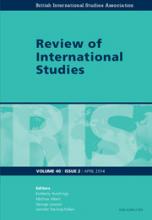Postsecularist Discourse in an 'Age of Transition'
Joseph A. Camilleri, ‘Postsecularist Discourse in an “Age of Transition”’, Review of International Studies, 38(5), December 2012, 1019-1039

The last twenty years have seen the emergence of an intriguing postsecular discourse which seeks to remedy the limitations of the secular interpretation of politics. The resurgence of religion in the public sphere, the vociferous articulation of fundamentalist worldviews, and the intensification of conflict within and between religious traditions as well as between religious and secularist dispositions are evidence enough of the need to rethink standard secularist formulations. However, this article argues that postsecularity as a concept raises as many questions as it answers. While it rightly draws our attention to the profound discontinuities of our age, post-secularist thought is too preoccupied with certain specificities of contemporary Western discourse and practice to be able to make sense of the wider challenge-response dynamic that is integral to the current period of transition. This article examines the lacunae of post-secularity and avenues for further development of its insights by reference to four closely interlinked features of a rapidly transforming world order: (a) the transnational character of much religious discourse and practice; (b) the decline of the West and the corresponding shift in the economic and geopolitical centre of gravity; (c) the complex relationship between the resurgence of religion and the wider phenomenon of identity politics; and (d) the emerging dialectic between conflictual and dialogical approaches to cultural and geopolitical pluralism.
